
feds charge four with illegally smuggling nvidia Federal prosecutors have charged four individuals with illegally smuggling Nvidia GPUs and HP supercomputers equipped with Nvidia GPUs from the United States to China.
feds charge four with illegally smuggling nvidia
Background on Nvidia and AI Chip Restrictions
Nvidia, a leading manufacturer of graphics processing units (GPUs), has been at the forefront of AI technology, particularly in the realm of machine learning and deep learning applications. The company has developed some of the most powerful chips available, including the H100 and the recently unveiled H200 models. These chips are crucial for training AI models, which require immense computational power.
In response to national security concerns, the U.S. government has implemented strict export controls that prevent Nvidia from selling its most advanced chips to Chinese companies. These restrictions are aimed at curtailing the potential military applications of AI technologies and ensuring that sensitive technologies do not bolster China’s capabilities in this domain. Despite these limitations, Chinese firms, such as DeepSeek, have managed to develop competitive AI models, raising questions about how they are acquiring the necessary technology.
The Smuggling Operation
According to court filings reviewed by Court Watch, the four individuals charged in this case—Mathew Ho, Brian Curtis Raymond, Tony Li, and Harry Chen—allegedly conspired to export Nvidia GPUs starting in late 2023. The operation reportedly involved shipping 50 of Nvidia’s H200 GPUs, along with several batches of the earlier H100 GPUs, without the required licenses.
Details of the Allegations
The court documents reveal that only one of the four individuals has been arrested thus far. The charges against them include smuggling, conspiracy, and money laundering. The alleged scheme involved the use of a front company named Janford Realtor, LLC, which, despite its name, was never engaged in any legitimate real estate transactions. Instead, it served as an intermediary for unlawful and unlicensed exports of advanced U.S.-origin GPUs with AI and supercomputing applications to the People’s Republic of China (PRC).
Mathew Ho, a U.S. citizen, was identified as the registered agent of Janford Realtor, while Tony Li, a Chinese national, was noted as a manager of the company. The filing also mentions Bryan Curtis Raymond, who is based in Huntsville, Alabama, as the CEO and sole owner of another entity referred to as “U.S. Company 1.” This company reportedly received nearly $2 million from Janford Realtor for its services.
Profiles of the Individuals Involved
Brian Curtis Raymond, who has been linked to the smuggling operation, describes himself on LinkedIn as the CEO of Bitworks, an AI infrastructure company that provides sales and support for Nvidia and AMD solutions. He has also recently taken on the role of Chief Technology Officer (CTO) for another AI cloud computing company called Corvex. His involvement in the smuggling operation raises concerns about the ethics and legality of his business practices.
Ho and his co-conspirators allegedly purchased GPUs from vendors, including Raymond’s company, using funds transferred from bank accounts in China. To evade export controls, they employed fake shipping letters and contracts, which further complicates the legal landscape surrounding this case.
Implications of the Smuggling Charges
The implications of these charges extend beyond the individuals involved. The U.S. government’s stringent export controls are designed to safeguard national security and prevent sensitive technologies from falling into the hands of adversaries. The successful smuggling of high-performance AI chips could undermine these efforts and enable Chinese companies to advance their AI capabilities more rapidly.
Moreover, the case highlights the ongoing tensions between the U.S. and China regarding technology and trade. As both nations vie for dominance in AI and other advanced technologies, incidents like this could exacerbate existing frictions and lead to further regulatory actions from the U.S. government.
Reactions from Stakeholders
In a statement regarding the smuggling operation, Nvidia spokesperson John Rizzo emphasized the rigorous nature of the export system. He stated, “The export system is rigorous and comprehensive. Even small sales of older generation products on the secondary market are subject to strict scrutiny and review.” Rizzo further noted that attempting to assemble data centers using smuggled products is impractical, both technically and economically, as data centers are complex systems that require a cohesive infrastructure.
This perspective aligns with broader concerns within the tech industry about the challenges and risks associated with smuggling advanced technology. The complexities involved in creating functional data centers from smuggled components could deter potential buyers and investors, thereby limiting the effectiveness of such operations.
Legal Consequences and Future Outlook
The legal ramifications for those charged in this case could be severe. If convicted, they may face significant prison sentences and hefty fines. The case serves as a warning to others in the tech industry about the potential consequences of engaging in illegal export activities. As the U.S. government continues to tighten its grip on technology exports, companies and individuals must navigate a complex regulatory landscape to avoid legal pitfalls.
Looking ahead, the outcome of this case may influence how the U.S. approaches technology exports to China in the future. It could lead to even stricter regulations and increased scrutiny of transactions involving advanced technologies. Companies that rely on international supply chains may need to reassess their compliance strategies to ensure they are not inadvertently violating export controls.
Conclusion
The charges against Mathew Ho, Brian Curtis Raymond, Tony Li, and Harry Chen underscore the ongoing challenges associated with regulating the export of advanced technology. As the U.S. government seeks to protect national security interests, incidents of smuggling and illegal exports may become more prevalent. The tech industry must remain vigilant and adapt to the evolving regulatory landscape to mitigate risks and ensure compliance.
Source: Original report
Was this helpful?
Last Modified: November 21, 2025 at 1:38 am
4 views















